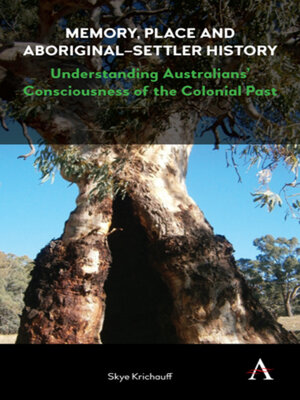Memory, Place and Aboriginal-Settler History
ebook ∣ Understanding Australians' Consciousness of the Colonial Past · Anthem Studies In Australian History
By Skye Krichauff

Sign up to save your library
With an OverDrive account, you can save your favorite libraries for at-a-glance information about availability. Find out more about OverDrive accounts.
Find this title in Libby, the library reading app by OverDrive.



Search for a digital library with this title
Title found at these libraries:
| Library Name | Distance |
|---|---|
| Loading... |
Taking the absence of Aboriginal people in South Australian settler descendants' historical consciousness as a starting point, 'Memory, Place and Aboriginal–Settler History' combines the methodologies and theories of historical enquiry, anthropology and memory studies to investigate the multitudinous and intertwined ways the colonial past is known, represented and made sense of by current generations. Informed by interviews and fieldwork conducted with settler and Aboriginal descendants, oral histories, site visits and personal experience, Skye Krichauff closely examines the diverse but interconnected processes through which the past is understood and narrated. 'Memory, Place and Aboriginal–Settler History' demonstrates how it is possible to unsettle settler descendants' consciousness of the colonial past in ways that enable a tentative connection with Aboriginal people and their experiences.
|The written histories, built memorials and spoken narratives of settler descendants often reveal an absence of Aboriginal people in Australian settlers' historical consciousness and a lack of empathy for those whose lands were taken over. This absence reflects an intellectual and emotional disconnect from Aboriginal people's experiences and from recent national debates about reconciling contested pasts. The aim of 'Memory, Place and Settler‒Aboriginal History' is to understand the evolution and endurance of this disconnect. Drawing on archival research, interviews and fieldwork, Skye Krichauff fuses the methodologies and theories of historical enquiry, anthropology and memory studies to investigate the multifaceted processes through which current generations of rural settler descendants come to know the colonial era. Primarily focussing on analysing and comparing the historical consciousness of a specific group of settler descendants – namely those who have grown up on land in the mid-north of South Australia that was occupied by their forebears in the nineteenth century – this book is additionally informed by interviews and fieldwork conducted with Aboriginal descendants. In addition, as a fifth-generation settler descendant herself, Krichauff utilises her insider status to provide personal insights and reflections with her analysis.
Within spoken narratives and during site visits, settler descendants demonstrate that their consciousness of the colonial past has been formed by growing up in places surrounded by people and objects that provide continuous reminders and physical evidence of the lives of previous generations. This book argues that the primary and most powerful way through which this group knows the colonial past is through lived experience. A recognition that (and how) previous generations' experiences transfer through the generations is crucial to any investigation into the past known and understood through lived experience. As such, this monograph investigates and contextualises the timing, speed and intensity with which rural districts were occupied, Aboriginal people were dispossessed, and the extent and nature of previous generations' relations with Aboriginal people.
Included in this monograph is an analysis of public histories (local written histories and plaques, monuments and information boards) which demonstrates a settler-colonial historical epistemology that frames the way mid-northern settler descendants make sense of the past. Memories of personal lived experiences are remembered, understood and articulated – are composed and constructed – using the public language and the meanings available in the wider culture in which individuals live. Krichauff provides concrete examples which demonstrate how,...







